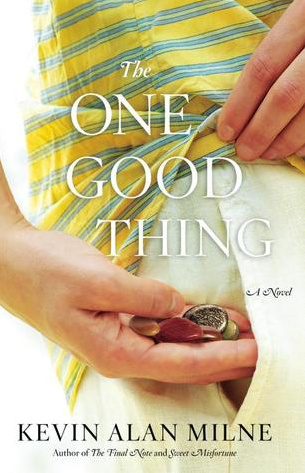

“Today, at this very moment in time, is as far into the future as you can go.”
― Kevin Alan Milne, quote from The One Good Thing
“God bless everyone who takes private moments to help other people in unseen ways.”
― Kevin Alan Milne, quote from The One Good Thing
“Because one good thing leads to another.”
― Kevin Alan Milne, quote from The One Good Thing
“God won’t protect you from what He can perfect you through.”
― Kevin Alan Milne, quote from The One Good Thing
“It’s one thing to feel sorrow, and another to actually do something about it.”
― Kevin Alan Milne, quote from The One Good Thing

“I hated making small talk and avoided people in the grocery store and other places just so that i wouldn't have to think of things to say. I liked people, i cared about them, and i wanted to be a good person, but don't make me chat idly on the telephone or make pleasant conversation just for the sake of being polite.- Josie Jo Jensen”
― Amy Harmon, quote from Running Barefoot
“Do you ever feel like you do something or are something for so long that it defines you?”
― Kasie West, quote from Pivot Point
“I would like to spend the rest of my days in a place so silent–and working at a pace so slow–that I would be able to hear myself living.”
― Elizabeth Gilbert, quote from The Signature of All Things
“He knew that his wings could ignite at any moment, but the closer he came to touching the fire, the more he sensed that he was fulfilling his destiny. As he put it in his journal that night: If I mean to save my life, then I have to come within an inch of destroying it.”
― Paul Auster, quote from The Book of Illusions
“Miracles are everywhere, and as I watch my sister--forever, beautiful, forever my little sister--staring into the eyes of the one man she ever loved, I know that indeed things do return to the beginning. The world opens again, and I see a life of happiness without fear. I gaze at my family--complicated though it may be--and know that fate smiles on us.”
― Lisa See, quote from Dreams of Joy
BookQuoters is a community of passionate readers who enjoy sharing the most meaningful, memorable and interesting quotes from great books. As the world communicates more and more via texts, memes and sound bytes, short but profound quotes from books have become more relevant and important. For some of us a quote becomes a mantra, a goal or a philosophy by which we live. For all of us, quotes are a great way to remember a book and to carry with us the author’s best ideas.
We thoughtfully gather quotes from our favorite books, both classic and current, and choose the ones that are most thought-provoking. Each quote represents a book that is interesting, well written and has potential to enhance the reader’s life. We also accept submissions from our visitors and will select the quotes we feel are most appealing to the BookQuoters community.
Founded in 2023, BookQuoters has quickly become a large and vibrant community of people who share an affinity for books. Books are seen by some as a throwback to a previous world; conversely, gleaning the main ideas of a book via a quote or a quick summary is typical of the Information Age but is a habit disdained by some diehard readers. We feel that we have the best of both worlds at BookQuoters; we read books cover-to-cover but offer you some of the highlights. We hope you’ll join us.